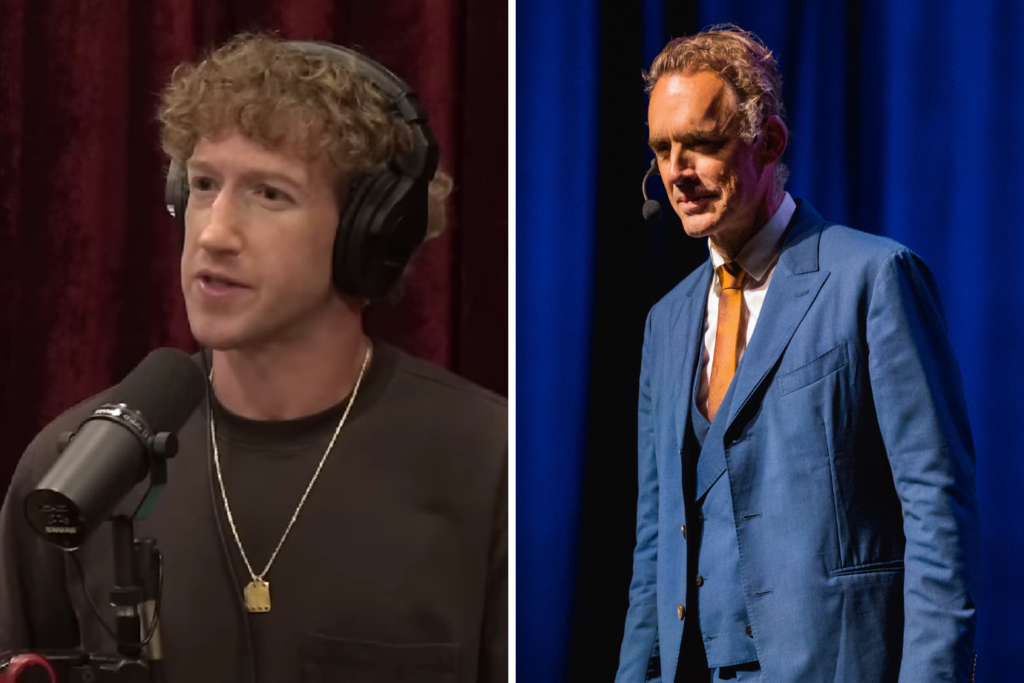January is a month that inevitably ushers in a lot of sentimental ideas about ‘fresh starts’. For some of us, that means splurging on an overpriced wall calendar. For Meta, it means scrapping DEI programs, with CEO Mark Zuckerberg disbanding his global diversity, equity and inclusion team.
As Zuckerberg explained on the popular podcast, The Joe Rogan Experience, he believes companies need to bring back more “masculine energy” into a “neutered” corporate culture.
The term “masculine energy” really landed, quickly generating a swarm of headlines globally.
In recent years, the conversation around ‘successful’ masculinity has become a fraught one. More than just an innocuous synonym for being ‘assertive’ or ‘action-oriented’, the term “masculine energy” stirs some strong, nostalgic ideas about male identity, suggesting a deeper yearning for a mysterious, bygone era of ‘real’ manhood.
The charged nature of the term can be explained, at least in part, by the bands of ‘manosphere’ influencers who populate our online world. This kind of elusive, mythical language about masculine strength as society’s bedrock is core to their rhetorical arsenal. None exemplifies this better than the Canadian psychologist turned Internet celebrity, Jordan Peterson, whose content hinges on a bizarre mix of self-help content, psychology, mystic philosophy and conservative ‘anti-woke’ politics.
Both Rogan and Peterson are key personas in the online ‘manosphere’, and share a sizable chunk of their audience.
I spent last year working on a project that investigated how Peterson uses social media to appeal to disillusioned young men. Beyond some reasonable advice about planning and goal-setting, Peterson’s content offers insight into how the ‘alpha’ male ideal has made its comeback, and is being readily exploited by tech billionaires like Zuckerberg.
As a social media influencer, Peterson is a paradox. Essentially, he sells a rhetoric of old-fashioned ‘tough love’ and paternal wisdom to an audience of meaning-seeking young men, while making an appeal to ruthless individualism. “To stand up straight with your shoulders back is to accept the terrible responsibility of life, with eyes wide open,” reads the first chapter of his bestselling novel, 12 Rules for Life.
In one of his most watched Youtube clips, he discusses the “meaning of life for men”, emphasising the importance of taking on responsibility and “choosing a path” as the key to a fulfilling life. Women, in his view, don’t bear the same burden of choice when it comes to finding a path, since biology prescribes this path already through childbearing.
In one Instagram post, Peterson leverages his status as an academic and psychological expert to diagnose our individual and cultural malaise, saying men are being “punished” for their strength and “enticed” towards weakness. He argues that a hysterical ‘woke’ left have misrepresented masculinity itself as “a manifestation of patriarchal oppression.”
“And so the best thing you can do if you’re a man is castrate yourself,” concludes Peterson.
In fairness, figures from across the political spectrum have criticised contemporary messaging around gender equality. Here in Australia, former Labour Prime Minister Julia Gillard questioned the effectiveness of terms like ‘toxic masculinity’, suggesting they are misleading and push men away. Similarly, Australian journalist and author David Leser tells me:
“We need to find a way of calling men in, not just calling men out. Perfection is the enemy of progress here.”
Still, I’m not convinced this proves “masculine energy” has become “neutered”, as Zuckerberg claims. What I’m more convinced of is that Zuckerberg is strategically leaning into this kind of rhetoric to advance his own business interests and avoid regulation, attempting to disguise it as some kind of glorious Culture War crusade. As Zuckerberg said during his appearance on The Joe Rogan Experience:
“You only start one of these companies if you believe in giving people a voice. I mean, the whole point of social media is basically giving people the ability to share what they want.”
Alongside the scrapping of DEI initiatives, Zuckerberg has also rolled back fact-checking and content moderation systems at Meta.
Figures like Peterson laid the rhetorical groundwork for tech billionaires like Zuckerberg to frame themselves as under attack by overbearing ‘woke’ regulators.
Strength and decisiveness are indeed important to successful leaders. But when billionaires like Zuckerberg convince us avoiding regulation and DEI is an act of masculine heroism, it helps no one except billionaires and cyberbullies.


